
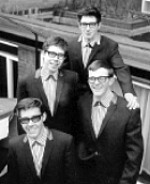
Go To Him by Ray Brown & The Whispers (1965) may be the B-side of their hit Fool, Fool, Fool (#3 Australia), but a B-side like this was a bonus for anyone who bought the single.
Retrospectively, Go to Him has taken on a life of its own. As the Milesago website puts it, Ray Brown & The Whispers’ track is 2m 30s of pure sonic adventure, one of those rare and extraordinary B-sides that almost eclipses the main event … Alec Palao included it on the Ace Records/Big Beat collection Hot Generation! 1960s Punk from Down Under (2002).
Tracing the original of Go To Him, I found a version by American band The London Knights on Mike, a minor New York label. One respected source had placed it in 1966, but it turned out to be from 1965, about three months before Ray Brown’s cover.
I tried to find out more about The London Knights. They had released only this single and they left no traces of their history that I could find.
Web searches unexpectedly led me to the website of British musician Tim Airey who had been in a 1960s Leicester band, The Four Sights, aka The Foursights. He recalled two recording sessions for Decca in London in 1963. The band released one unsuccessful single, and there were songs for another single that was never released in the UK. However, as Tim explained, … [the single] was supposed to have been released in the States under the name of The London Knights …
The Four Sights then heard nothing more about any American release.
Well, not until some 40 years later when I emailed Tim in 2003 to point out that there was indeed a London Knights US single, from 1965, with a track called Go To Him that credited Bess Coleman as co-writer. Bess was a sister of Four Sights guitarist Bill Coleman, and she had written both sides of the Four Sights’ Decca release.
When I sent an mp3 of the London Knights recording to Tim he was adamant that it was one of the lost tracks from the Four Sights’ London sessions. He identified the distinctive voice of Four Sights drummer and lead singer David Lindsay, and David himself subsequently had no doubt at all that he was listening to his own voice on the London Knights track. David later sent me further evidence that supported this.
The case made by Tim and David was compelling, and I had no reason to doubt them, but I still could not explain some aspects of the "London Knights" single.
The writer credits on the label are to Bess Coleman with Artie Wayne, Bess's American collaborator whom she met in the US early in 1964. Bess is also credited as producer, for Artie’s production entity AWK.
When I asked Artie about it, he recalled recording Go To Him in New York as The London Knights with Bess and her brother Bill Coleman from the Four Sights, and I assume the label credits on the Mike single mistakenly reflect that session.
The mystery remains around the exact pathway of Go To Him from the Four Sights in London to Mike Records in New York, with an unreleased re-recording along the way. My best guess is that there were two recordings, one from London and one from New York, and they were somehow mixed up at the New York end.
You can read the rest of what I know by clicking on the link below. Or you could just mentally file it under O for Obsessive Fans of Obscurity and move on.
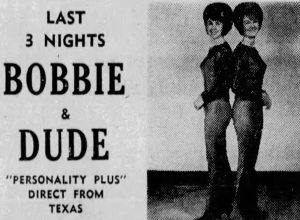
Country and pop singer Maria Dallas was a star in New Zealand. Her first single Tumblin' Down (1966, #11 NZ) won the prestigious Loxene Golden Disc Award, but her most successful single in NZ was Pinocchio (1970, #1), her fifth to chart Top 30 there.
In Australia, though, Maria's biggest hit was with Ambush (1967, #16), recorded in Nashville where she went after working in Australia for a while. The song stood out for its unforgettable rhythmic line at the end of verse and chorus: Your kissin’ leavin’ good-time days are dead. It was later recorded by Teresa Brewer (1975) and by Australian country artist Craig Giles (1993), but Maria's was the original release.
Ambush had been copyrighted a few months earlier by its composers, two sisters from the small Texas town of Moody, near Waco. As it happens, Maria Dallas was also from a small town, Morrinsville in New Zealand.
Bobbie Jo and Elizabeth Ann Brown had been singing from an early age in The Brown Sisters, a solidly booked country-gospel trio with another sister, Bettie.
By the time of Ambush they were a duo called Bobbie & Dude. The stage name Dude was adopted by Elizabeth because it seemed to go better with Bobbie. They toured widely, and performed during Expo ’67 in Montreal where their only single had some radio airplay. As far as I can see they did not record Ambush themselves.
For a long time I knew almost nothing about Bobbie & Dude apart from their writing credits for Ambush and a few other songs. I was puzzled by the addition of Elizabeth Ann Brown to co-writer Dude Brown's name in Ambush's copyright registration, but I had never thought of searching for "bobbie and dude" in quotes.
As I have often typed here, Eventually, someone emails. This time it was someone who knew Elizabeth Ann well, and their tantalisingly brief words gave me the clues I needed.
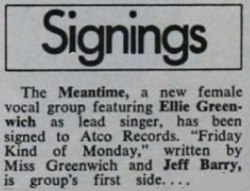
Johnny Farnham's cover version of Friday Kind Of Monday (1968) was a hit in Australia (#6) and New Zealand (#11).
The original version from 1967 was by The Meantime, a group that came out of nowhere, released this one single that failed to chart Top 100, and that was it.
This looks like a clear case of obscurity until you follow the lead in the writer credits. Friday Kind Of Monday was written by Jeff Barry and Ellie Greenwich, one of the most successful songwriting teams of the 1960s, and a married couple from 1962 to 1965.
As Billboard announced, the lead singer on the Meantime single is Ellie Greenwich but, more than that, the whole recording is a studio project by Greenwich and Barry.
They had previously written and recorded as The Raindrops whose seven singles 1963-65 included He's The Kind Of Boy You Can't Forget (1963 #17 Bb, #15 CB) and What A Guy (1963 #34 CB). They charted moderately in most Australian cities, but in Adelaide they had hits with Kind Of Boy (#4), and That Boy John (1963, #12).
When you listen to a Raindrops record, you are most likely hearing Greenwich's voice double-tracked, with Barry's bass vocals and prominent drumming. For live appearances and for photos of a trio, other personnel were recruited.
This reminds me of Leiber and Stoller's view that We don't write songs. We write records.
The Meantime was a similar project, a Raindrops for the late 60s, created in the studio by Barry and Greenwich. There is a cryptic clue in the group's name: think Greenwich Mean Time.
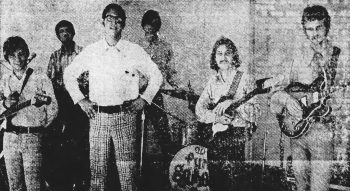
The Grooviest Girl In The World was a #3 New Zealand hit in 1969 for Wellington band The Simple Image.
The original version was released in the US by The Fun And Games, a six-piece band from Texas with four members who had been band-mates since their high school years in Houston. They included the Romano brothers, Joe and Rock, who both went on to successful careers in various branches of the arts (there is a Wikipedia page about Rock).
The Fun And Games version of The Grooviest Girl In The World was produced by one of its writers, Gary Zekley. He is partly known for singing, co-writing and producing on the single Yellow Balloon (1967 #25 USA) and the subsequent album by The Yellow Balloon. These later became artifacts of the retrospectively named genre of Sunshine Pop.
The Simple Image were one of those fine New Zealand bands of the 60s-70s that topped the charts in New Zealand with records that were unfamiliar to most Australians. NZ artists such as The Simple Image, The Dedikation, The Avengers, and The Fourmyula had #1 or #2 NZ hits that never surfaced in Australia.
There's a twist to the story of The Grooviest Girl In The World that I discovered later. Although most Australians would not be able to hum the tune for you, a Boomer from South Australia might know it. The original version by The Fun And Games charted in Adelaide in March-May 1969, peaking at #3 (in the US it reached only #78 Billboard). This is a surprising outlier which I suspect is down to radio airplay on Adelaide's 5AD.
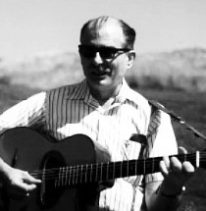
In 1960 Bob Wilson released the original version of (And Her Name Is) Scarlet. A later version by The De Kroo Brothers was a #9 Australian hit in 1963
Bob Wilson's recording came out on LA label Era. It was written by Steven Howard, a pseudonym of Era's co-founder and owner Herb Newman (1925-1976). He had co-written The Wayward Wind, a hit for Gogi Grant on an Era single (1956, #1 USA).
Before The De Kroo Brothers got to it, Keith Colley had recorded Scarlet, again on Era (1962), and there had been a German version in 1961.
This was interesting, and not hard to find out, but who was Bob Wilson? The trouble is that the world is full of Bob Wilsons, so his identity was infuriatingly difficult to search for. I discovered that even BMI, the US copyrighting outfit, had registered compositions by at least three different Bob Wilsons together under one name.
Eventually, someone emails. This time, it was a longstanding friend of Wilson who had much information about his life and career. Thanks to him and some further digging, I was even able create a passable Bob Wilson article at Wikipedia.
This Bob Wilson was a guitar virtuoso and singer-songwriter from Pleasant Hill, California. As a teenager just out of high school he recorded some singles on Era, then had a long career as a schoolteacher with occasional reappearances on record.
For example, he featured on an album by folk artist Janet Smith in 1968, and he released albums with Rick Shubb (the Shubb Capo inventor) in 1976 and 1999. In the mid-2010s his Bob Wilson Ensemble appeared at the California Academy of Sciences in San Francisco.
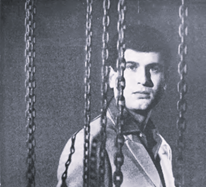
In 1960s Germany, singer-songwriter Drafi Deutscher was a chart-topping pop star, but to most Australian pop fans at the time his name would have been, well, obscure.
Johnny Chester's moderate hit Teeny (1963 #28 Australia), with English lyrics by Johnny himself, is a cover version of Teeny by Drafi Deutscher And His Magics.
More than that, Johnny is singing over the backing track recorded for Drafi’s single, and he repeats the procedure on the B-side with Do The Stomp, a cover of Drafi’s B-side Shu-bi-du-bi-do The Slop, again with Drafi's recycled backing track.
The following year, W&G did this again when Merv Benton sang new lyrics by Noel Watson over the backing tracks from both sides of Drafi's single Shake Hands / Come On, Let’s Go.
English translations or rewrites of songs are not unusual. The lady in Mark Holden's I Wanna Make You My Lady (1976) was an angel in the original Swedish hit Jag Ska Fånga En Ängel. You're My World came from Il Mio Mondo, and My Way came from Comme d'habitude.
The idea of recording vocals over the backing track of an original version is not unheard of either. Six months before Johnny Chester's Teeny, Ben E. King's 1963 hit I (Who Have Nothing) had used the backing track from Uno Dei Tanti (1961) the original version by Joe Sentieri.
Other double-sided covers exist, too. In 1957 The Diamonds covered both sides of The Rays’ single Silhouettes / Daddy Cool, and in 1964 Australian band The Cicadas covered both sides of The Marauders' British single That’s What I Want / Hey Wha’ D’Ya Say with some regional chart success.
But W&G's twofold use of the manoeuvre I like to call the double-sided cover version with English adaptation and recycled backing track must be unique.
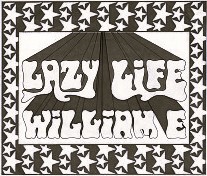
Lazy Life, released by Sydney band Heart And Soul in 1969, had already been a #1 hit in South Africa for Quentin E. Klopjaeger in 1968.
This sounds like an obscure artist, but Klopjaeger was in fact Billy Forrest, a popular singer-guitarist who was far from obscure in South Africa.
Although the Klopjaeger version is much better known, the original Lazy Life was by William E, released in the UK in 1967.
William E was British singer-guitarist William E. Kimber. His band Bill Kimber And The Couriers had worked with some success in South Africa in 1963-64 when British music was taking off worldwide.
A distractor arises in the history of Lazy Life because for some reason Billy Forrest also recorded as William E, in 1971-2. This easily leads to confusion with the William E (Bill Kimber) who released Lazy Life in 1967.
So Billy Forrest recorded as Quentin E. Klopjaeger (1968) and William E (1971-2), but even "Billy Forrest" is William Charles Boardman, clearly a fan of the pseudonym.
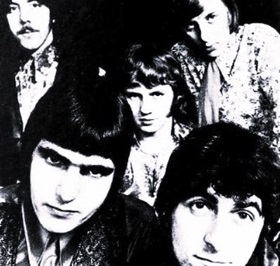
When I found out who had recorded the original version of Smacka Fitzgibbon's minor Australian hit Waterloo Road (1970), I asked the obvious question, "Who's this bloke Jason Crest?"
Not a bloke, but a whole band from Tonbridge in Kent with a name that sounds like one bloke.*
When they were signed to Philips, the band was called The Good Thing Brigade, but a change of name was thought to be in order. Their repertoire included an original song entitled The Collected Works of Justin Crest so they tweaked that bloke's name and became Jason Crest.
The history of Waterloo Road indirectly takes in Blackburn's Four Pennies, another band that recorded for Philips.
• Mike Wilsh, co-writer of Waterloo Road, was a former Four Penny
• Fritz Fryer, also from the Pennies, had moved on to A&R and production and was influential in Jason Crest's
signing with Philips.
• Lionel Morton, another Penny, also recorded Waterloo Road, in 1969.
• Wilsh, Fryer and Morton wrote The Four Pennies' #1 hit Juliet (1964).
Before Smacka Fitzgibbon got hold of Waterloo Road, it was adapted by Pierre Delanoë as Les Champs-Élysées and became a hit for French-American singer Joe Dassin (1969) in France, Switzerland, Germany, The Netherlands, and Belgium. Dassin's recording of Les Champs-Élysées may be familiar to some from Wes Anderson’s film The Darjeeling Limited (2007).
These days, someone might also ask, "Who's this bloke Smacka Fitzgibbon?" You could start with the distinguished Australian Dictionary of Biography under Graham Francis (Smacka) Fitzgibbon (1930-1979), jazz musician, hotelier and restaurateur.
* Jason Crest is not unique as a band name that sounds like one bloke. How about Jethro Tull, Mungo Jerry, Judas Priest ...?
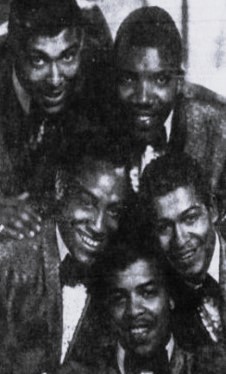
Australians knew You Are The One I Love through the 1968 version by Melbourne group The Groove (#3 Brisbane, #30 Melbourne).
The original version was by Adam's Apples (1967), a truly obscure group. They were apparently a vocal quintet, but apart from the usual discographic details I couldn't find much more about them.
Even a well-informed discussion at Soul-Source.co.uk was inconclusive. There was a suggestion that they were a studio outfit, but other posts had anecdotes about meeting them, or nearly meeting them, or knowing someone who met them. In places it feels like the plot of a mystery novel.
One promising lead came from someone who had once interviewed Adam's Apples and confidently stated that they were from New Brunswick in New Jersey.
We also have a photo of them in an ad for New Jersey's Palisades Park in 1967. (I could apply strict rules of evidence and call it "a photo of an Adam's Apples", but it seems plausible that they are the same group.)
Paul Leka wrote You Are The One I Love with Shelley Pinz as well as arranging, conducting and co-producing on the Adam's Apples recording. He later produced a newly arranged version by The Leaders who some say were in fact Adam's Apples but I can't verify that either.
Adam's Apples never had a hit record and might be hard to trace but, like many overlooked 60s soul artists, they found a new audience amongst Northern Soul fans. To them we are once again grateful.
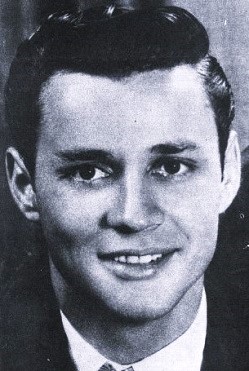
John D. Loudermilk's composition Midnight Bus was well known in Australia in the 1960s through the local version by Betty McQuade.
Released in 1961 and again in 1965, her record topped the charts in Perth, reached #6 in Melbourne, and made Top 20 in Brisbane. Another Australian version by Johnny Chester had some chart success in 1972.
As Loudermilk aficionado Kees van der Hoeven puts it, McQuade recorded the definitive killer version … a rock & roll classic. Loudermilk had no knowledge of this Australian version until Kees told him about it in the early 2000s.
Loudermilk’s own recording of Midnight Bus came out in 1960 and charted modestly and uniquely in Brisbane (#27) the year before Betty McQuade’s release.
Loudermilk’s version wasn’t the original, though. Delaware-born singer-guitarist Billy Graves released it first, in 1959.
Before that, Graves and army music buddy Dick Flood appeared on Country music TV shows and released a couple of singles as The Country Lads. A Billy Graves solo single (one of a handful 1958-66) that charted #53 Billboard.
Billy Graves later led Wanda Jackson’s band then worked in Nashville as a session musician, songwriter, A&R man and producer, as well as managing the Nashville branch of a music publisher.
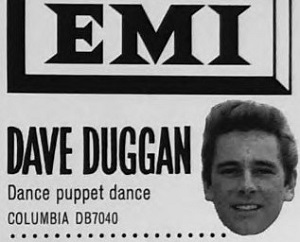
These days I'm reluctant to say an artist has disappeared just because they stopped releasing records (I've explained why in a recent blogpost).
It is tempting, though, in the case of Dave Duggan. He released one record, the original version of Dance Puppet Dance (1963). It wasn't a success, and Dave seems to have gone back to… just what or where, we don't know.
In Australia the song Dance Puppet Dance lived on. Down here it is identified with Sydney singing star Little Pattie who in 1965 made it her own on national TV and had a modest chart hit with it.
Dave Duggan's recording of Dance Puppet Dance had good credentials, written by a top British songwriter, Les Vandyke, and recorded with Geoff Love's orchestra for a major label. It was reviewed in the pop magazines, played on the BBC, and performed on at least one TV pop show. Thanks to an EMI ad for the single in Pop Weekly, we have a photo of Dave, even if it is severely cropped to show just his head.
A rare Dave Duggan sighting is in a 1963 Nottingham newspaper column (possibly syndicated) which at least tells us his age at the time, 21 (so, born c.1942). Apart from that, his hobby was body-building, and there are a few words of appreciation about his voice.
"Dave Duggan" is one of those names that throw up lots of red herrings in search results. For example, a lad born c.1942 might have been too young in 1957 to have been playing with the Dave Duggan Skiffle Group in the pubs and skiffle clubs of Islington, London.
Until someone (maybe Dave) emails, the story of where he came from and where he went will remain a mystery. In the meantime, I promise I have sworn off messaging elderly Dave Duggans found on social media.
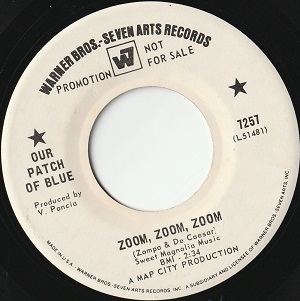
Zoom Zoom Zoom (1969) was not a big hit for Melbourne's Cam-pact, but it was a favourite of mine and a highlight of the band's live sets. Cam-pact's well-known founding member Keith Glass had already left when it was recorded in Sydney, but he told me he was in the studio doing "something - bashed a tamborine or made some sort of noise". The single charted #38 in Melbourne.
Not unusually for that time, I assumed it was an original, local composition. Years later, when I had learnt not to assume that about Australian records of the era, I tracked down a second-hand 45 of Zoom Zoom Zoom by Our Patch Of Blue (1968) to confirm my suspicion that it was the same song. (If that seems like a lot of trouble to go to, this was before the days of instant label shots from 45Cat and instant audio from YouTube.)
Our Patch of Blue, known to its fans as The Patch, was from Rhode Island. Zoom Zoom Zoom was written by the band's Bernie de Cesare (heard on vocals and guitar) and Pat Zompa. It was produced by Rhode Islander Vini Poncia who regularly wrote, recorded and produced with Pete Anders and later wrote with Ringo Starr. (See my Anders & Poncia playlist at Spotify.)
Details about The Patch are hard to find. They released an EP in Mexico under the band name Los Parches Azules, and Zompa & de Cesare wrote some songs that were recorded by Fats Domino and by Tiny Tim, and that's about all I know.
At YouTube, look for tantalisingly brief comments on their songs by Pat Zompa. Under Fats DomIno's Honest Papas Love Their Mamas Better he types: Just saw this on YouTube after writing it with my partner Bernard Decesare in 1967. If anyone knows of Mr. Decesare's whereabouts, please comment.
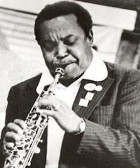
In the 50s and into the 60s, a radio deejay might use an instrumental record as a theme to their program. It would often continue in the background, faded in and out between records.
Thanks to this convention Velvet Waters (1959), a record by US studio band The Megatrons, became known to many Australians. This was despite the record not being released in Australia.
Velvet Waters was used as a theme by Pete Smith on 3AR Melbourne. Pete would say, "Ah, that theme!" and mischievously remind his listeners that they couldn't buy it. It was also heard as a theme on 3KZ Melbourne during the summer of 1959-60.
Up in Sydney on 2UE, John Laws was also playing Velvet Waters, off an acetate copy. Sydney-based singer Bruce Gillespie wanted to record it, so he and his manager borrowed the acetate and arranged to have professional lyricist Dorothy Dodd write words to the song.
Bruce's vocal version (1960) wasn’t a hit, but when Tony Worsley later recorded Dorothy's lyrics (1965) Velvet Waters became known to a far wider audience. Even without the haunting clarinet of The Megatrons' original, it charted #1 Brisbane, #3 Adelaide, #5 Sydney, and #9 Melbourne.
The Megatrons were a studio band whose biggest charting record was Velvet Waters at #51 in the US. Not much is known about the members apart from Heywood Henry, an experienced reeds player and session musician credited on the label for his clarinet. Composer William Plunkett is also heard on the record, but details about him are elusive apart from a handful of writer credits, some of them with co-writers.
William Plunkett's composition really made an impression on some Australians. The notable Australian author Gerald Murnane wrote a story called "Velvet Waters". The main character recalls hearing the Megatrons' record on Melbourne radio, relayed over loudspeakers at St Kilda beach in December 1959. The story was published in a collection that was also called Velvet Waters (1990).
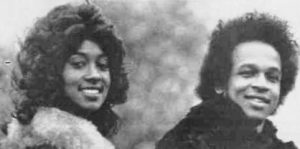
The Rag Dolls are often confused with the American girl group of the same name who recorded with The Four Seasons' producer Bob Crewe.
But no, this is London group The Rag Dolls. They were the first to release My Old Man's A Groovy Old Man, known to Australians through the 1969 version by The Valentines .
The group remains obscure but one member, Katie Kissoon (b. 1951), later became well-known in brother-and-sister duo Mac And Katie Kissoon. Some sources say brother Mac (b. 1943) was in The Rag Dolls too, but I'm not convinced.
Mac And Katie Kissoon (real surname Farthing) had five UK Top 50 hits 1971-76 including Sugar Candy Kisses (1975, #3) and Don't Do It Baby (1975, #9). Their version of Chirpy Chirpy Cheep Cheep also charted in the US (1971, #20 USA, #41 UK), and they had some chart success in other European countries.
Katie and Mac have been in other groups and recorded under their own names. Katie is known for her session work for the likes of Van Morrison, George Harrison and Elton John.
My Old Man's A Groovy Old Man was written by Harry Vanda & George Young of The Easybeats who recorded it first, in 1967, but it wasn’t released until October 1969, after the Rag Dolls UK version (March 1968, earning it original status). Between those releases came the Australian hit version by The Valentines (February 1969).
Image: Katie and Mac Kissoon during their success in the 1970s as a duo.

New Zealand band Ray Columbus And The Invaders understood what the Beatles were told to do in Hamburg: Mach schau! or Make show! In other words, Put on a show!*
The Invaders' TV clip of She's A Mod (1964) is still a delight, with Ray Columbus's startling dance moves out front of a committed, energetic band whose schau includes an animated performance from drummer Jimmy Hill.
She's A Mod was a chart-topping hit in Australia in 1964. (New Zealand charts hadn't quite got off the ground then, but Warwick Freeman retrospectively places it at #17 NZ.) I probably wasn’t alone back then when I assumed that She's A Mod was a New Zealand composition. Dispelling assumptions like that became the premise of this website.
She's A Mod turned out to be a cover version of a song first recorded by The Senators for the album Brum Beat (1964). This was a sampler album of tracks by upcoming Birmingham groups, in a similar vein to an earlier album called Mersey Beat. She's A Mod was also released in the UK on a single but was not a hit. The track is notable for the participation of the band's new drummer John Bonham, later of Led Zeppelin.
The composer of She's A Mod was The Senators' lead singer Terry Beale. Ray Columbus openly acknowledged the source of She's A Mod, and spoke warmly about meeting Terry Beale in later years.
The song is sometimes misattributed to Bobby Child whom Terry Beale replaced in The Senators. When Terry Beale joined he used the name of his predecessor for a while, partly because the band's van still had Bobby Child professionally painted on it.
*There are varying accounts of the Mach Schau! story. I've gone with the spelling and brevity of Craig Brown in One, Two, Three, Four: The Beatles in Time (2020)
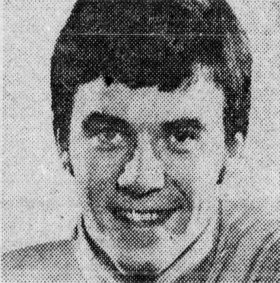
The serene and introspective Picking Up Pebbles was a big hit in Australia for Matt Flinders in 1969, proving once more that late 1960s radio wasn’t all folk-rock, garage bands and psychedelia.
It was first recorded by its composer Johnny Curtis on UK label Major Minor. For a long time I couldn’t find out anything about Johnny Curtis. It’s one of those names that throws up lots of irrelevant search results (don’t get me going on multiple Bob Wilsons).
Was he the Irish folkie called Johnny Curtis, or Johnny Curtis the Native American gospel singer? Surely the composer of Picking Up Pebbles couldn't be the same Johnny Curtis who was in UK soul duo Frankie & Johnny with Maggie Bell ?
Eventually, though, someone emails. Then I had Johnny's real name, Bobby Kerr, and confirmation that he was indeed in Frankie & Johnny. Their fabulous Northern Soul-friendly I'll Hold You was already familiar to me (1966 YouTube). It's quite a contrast to Picking Up Pebbles.
The stories of Bobby Kerr and his musical associates were now easier to find. The end of Bobby's story is too sad and it came too soon, but that’s what you find when you go looking for people’s stories.
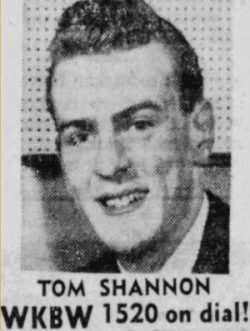
The Thunderbirds were one of Melbourne's most popular live bands over many years. Their instrumental Wild Weekend was well-known in Melbourne where it charted twice. In 1960 it reached #13, then it was reissued and made it to #31 in 1963.
This mirrors the history of the original release by Buffalo NY band The Rebels. Their version first came out in 1960 but didn't chart nationally until it was reissued late in 1962. Soon after, it was reissued again using the name The Rockin' Rebels.
That was the first release, on a record. The true original, by The Russ Hallett Trio, was heard only on radio, as a jingle for Tom Shannon's deejay show on WKBW in Buffalo. Being a jingle, it had words: Top tunes, news and weather, This is the spot where things get better, On the Tom Shannon Show…
The Rebels cleverly took the melody and arranged it as the instrumental that Victorians of my age know so well through the Thunderbirds' cover.
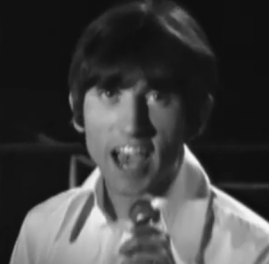
Eventually, someone emails.
For years I had listed Russell Morris's recording of Rachel (1969) as the original version. It was written by an Englishman, Raymond Froggatt, and Morris had picked the song up in England, but his Australian version seemed to be the earliest release.
If I get something wrong, eventually someone emails. This time it was Phil Barton, alerting me to an earlier version of Rachel by Dave Justin on an obscure UK single on Polydor in 1968.
If this were a book, the error would still be on the shelf awaiting a second edition, but at a website you can fix it straight away.
Dave Justin, real name Dave Forey, released four singles 1967-68. Before that he was in Justin And Karlsson with John Woolsgrove for one single in 1966.
The Beat-Club channel at YouTube notes that he moved to Cornwall, married and raised two children and formed a group called Finger in the 1970s.

Little Pattie's Australian version of Little Things Like That opened Side 2 of her 1967 album Little Things Like This.
Not only did this boost the song's prominence, it also meant that the wording on the Side 2 label went like this:
2 LITTLE THINGS LIKE THIS
1: LITTLE THINGS LIKE THAT.
By this time, the song had been recorded by at least four other singers.
• Australian singer Donna Gaye released it in September 1966 as a follow-up single to her minor hit Norman-“Normie”.
• In January 1966, Linda Lloyd from Pensecola FA released Little Things Like That. She had a day job in Dallas before moving to Hollywood and releasing three singles on Columbia 1964-66.
• In December 1965, Suzy Wallis released a version. As a 10-year-old she had hosted her own TV show in St Louis MO. Her record was arranged by David Gates, not yet in Bread but turning out lesser-known but now admired recordings by other artists.
• The original version of Little Things Like That (November 1965) is by Texan singer Barbara Mills on Nashville label Hickory. It was produced by her brother Larry Henley, well-known as the falsetto lead singer of The Newbeats and as co-writer of The Wind Beneath My Winds. It isn't on YouTube or any streaming service that I use, but it is on a recent CD from Teensville.
Another Barbara Mills song, Queen of Fools (1965), has become much better known and easy to find. For this we can thank Northern Soul, that British music and dance movement renowned for its boosting of obscure records.
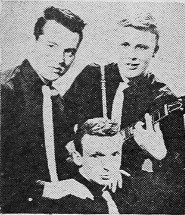
Three recordings of So Tough were released in the US 1957-58 but it was never a big hit and the artists remained obscure.
In Australia, Johnny O'Keefe made it his own. His July 1958 version was a hit, and one of his greatest records. It sounds as if it were written for him, a perfect match of song and singer.
If all four versions are still worth a listen today, it's down in no small part to the composer Gary Mears, lead singer on the original version by Dallas vocal group The Casuals in October 1957.
The subsequent history of So Tough isn't straightforward. The Casuals soon re-released their original as The Original Casuals, and around the same time there were versions by The Kuf-linx and The Cufflinx, not to be confused with their contemporaries The Cuff Links (aka The Cufflinks) who never recorded So Tough. And if a song called Tracey from 1969 comes to mind, those Cuff Links are something altogether different.
At my page on So Tough I have boiled it down to a few paragraphs, with links to the real experts if you want to dig more deeply.
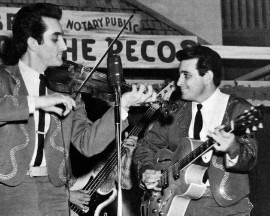
Obscurity is a relative term: one person’s obscurity is another’s celebrity.
Rusty & Doug, the Kershaw brothers, were probably unknown to most fans of Australian Top 40 radio, but an aficionado of 50s Cajun or Country music would recognise their names.
Certainly, Doug Kershaw is no obscurity to the Louisiana Music Hall of Fame where he is an inductee. The same goes for the fans who put his singles onto the Country charts, and for the music stars whose records he played on.
The audiences of deejay shows in 1950s Australia might have been oblivious of all that, but they would almost certainly recognise Hey Sheriff, a Felice & Boudleaux Bryant composition recorded by Rusty & Doug.
Their version was the original, but here in Australia Johnny Rebb made it his own with a fine local cover version.
It wasn’t a huge hit, but it was such a staple of Australian radio that many Australians would be surprised to learn that it originated with a duo of brothers from Cameron Parish, Louisiana. That’s what happens when we answer the perennial question, Where did they get that song?
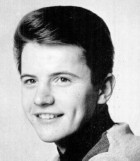
A sensational young star is born with a smashing debut single said the Billboard display ad when 17-year-old Arnie Corrado released his first record in 1966.
His singles on Date and its parent Columbia 1966-67 carried some notable credits. Four Seasons arranger Charlie Calello arranged six sides, and produced five of them. The writers include Toni Wine, Carol Bayer-Sager, Artie Resnick, and Joey Levine.
None of these records made Arnie a household name. I recommend How Many Times (Will I Send You Kisses), a great song with a strong performance by Arnie, and terrific orchestration and pop production values thanks to Calello. Maybe it was a little old-school for 1966, but I love it all the same. It's at YouTube.
Arnie next appeared on Mercury, with his name tweaked to Bobby Corrado. The record is I Can't Get Sunday Out Of My Mind (1969), and the writers are Alan Bernstein & Victor Millrose who wrote Gary Puckett's hit This Girl Is A Woman Now.
Again, no hit, but Arnie aka Bobby released the track again the following year on Capitol, this time using the name Chris Holland (1970).
The song also earns Arnie an inconspicuous footnote in Australasian pop history, because I Can't Get Sunday Out Of My Mind became known down here thanks to versions by NZ band Chapta (1972), and by Rod Kirkham for a modest Australian hit (1973).
There was one more Chris Holland single, with T-Bone, on Motown's Rare Earth label (1972). After that, Arnie Corrado returned to work with his dad Ralph in his famous Rosie's Diner in Little Ferry, New Jersey, so renamed after Nancy Walker was filmed there as Rosie the Waitress in a series of TV ads for Bounty paper towels.
The diner has a rich history of its own, well documented in newspaper archives and by diner aficionados, and Arnie is often mentioned.
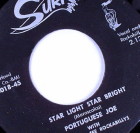 There are many songs called
Starlight Starbright (thanks to the nursery rhyme) but the one that most Australian Baby Boomers recognise was a hit for Lonnie Lee
in 1960.
There are many songs called
Starlight Starbright (thanks to the nursery rhyme) but the one that most Australian Baby Boomers recognise was a hit for Lonnie Lee
in 1960.
It was written by John Marascelco who is far from obscure to those who know their songwriters. Good Golly Miss Molly is one of his.
More obscure is Portuguese Joe who recorded the original of Starlight Starbright, a B-side, with The Tennessee Rockabillys. His entire discography is made up of two singles in 1957. After that, no sightings.
The A-side, Teen Age Riot, is co-written by Joseph Alvez, and the consensus is that he was Portuguese Joe. Some sources say that he is the same Joe Alvez (b.1936) the art director and designer who worked on Jaws and Close Encounters of the Third Kind. Yet to be confirmed, in my view.
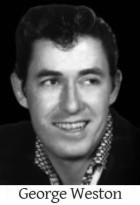
Obscurity is a recurring theme in the history of Well, Don’t You Know, a 1965 hit in Melbourne for Colin Cook.
Well, Don’t You Know had already been a Top 10 hit in Australia in 1960 for US singer Crash Craddock. Years later he was famous in country music, but at that time he was an obscurity in the US and a star in Australia, thanks to his first #1 hit down here with Boom Boom Baby (1959).
Even more obscure was the originator, George Weston from Littlerock CA, who recorded on obscure labels in nearby Palmdale and in Bakersfield.
Weston wrote Well, Don’t You Know (1958) and travelled to Hollywood to record the original at Jackpot Records, a small, obscure label part-owned by singing cowboy Gene Autrey.
George Weston is remembered by those who knew him as a charming and talented singer-songwriter-guitarist who unjustly remained, well, obscure.
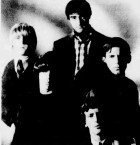
The Roosters were formed in 1964 by high school friends in the Los Angeles suburb of Westchester. In December 1967 they released their their fourth single, Love Machine.
Their previous singles had been on minor labels with songs written by band members, but this one was on Philips, written and produced by regular collaborators Michael Gordon and Jimmy Griffin, and arranged by the notable producer-arranger-composer Al Capps.
The Roosters' single pops up on a scattering of US radio surveys in 1968 (#2 in Ogden, Utah, is pretty good), but it made only #106 on Billboard's national chart, and this was their most successful single.
Later in 1968, Love Machine charted at least Top 20 in all of Australia's state capitals when a one-off studio band called Pastoral Symphony released a version. It was rearranged by Johnny Hawker, whose band played on the record along with The Twilights. The lead singer was Terry Walker, who would be heard later in the year on The Strangers' classic Happy Without You.
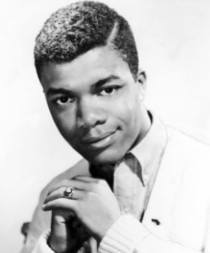
Ray Brown & The Whispers had a hit in 1965 with Pride, a song that had already been recorded by Billy Thorpe, Playschool's Don Spencer, and Billy J. Kramer.
Before them all, in 1963, came Brent Edwards, a singer from Philadelphia who was in a vocal group called The Lavenders. Leon Huff, later of Gamble & Huff, the Philly Soul masterminds, played piano for The Lavenders.
Johnny Madara and Dave White, who wrote the song as Pride Is Such A Little Word, later wrote Johnny Farnham's big hit Sadie The Cleaning Lady with a third writer.
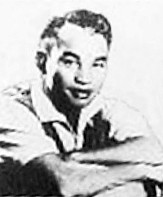
This Hawaiian singer, little-known outside his home state, released the original version of She's My Baby in 1959. A few months later, Johnny O'Keefe released his version that became one of his biggest hits and and a classic oldie in Australia.
JO'K heard of the song through one of its co-writers, Scott Turner, a Canadian-born singer-songwriter-guitarist who was touring Australia with Tommy Sands. He would later play on JO'K's recording session for the song at Gold Star Studios in Los Angeles.
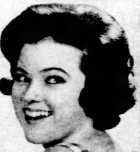
In 1963 Kerri Downs released the original version of 4,003,221 Tears From Now. Her record didn't chart, but in 1964 Judy Stone covered the song, making it one of the most familiar Australian oldies of the 1960s
Kerri Downs was later in US girl group The Angels, although she joined after their hit My Boyfriend's Back. She was married to producer Gerry Granahan, co-creator and lead singer of Dicky Doo And The Don'ts.
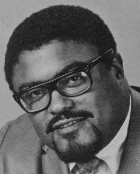
He might be obscure to many Australians, but American football fans would know Roosevelt 'Rosey' Grier as a star of the New York Giants and the Los Angeles Rams in the 1950s and 60s. He later went into films and TV, and is well enough known to have appeared as himself in an episode of The Simpsons
In 1964 he recorded Fool, Fool, Fool, produced by Bobby Darin, a song that would become a #1 hit in 1965 for major Australian pop group Ray Brown & The Whispers.
Later, he wrote a book about needlepoint crafts, and became a minister of religion. As a bodyguard for Robert Kennedy, he subdued and disarmed Kennedy's assassin in 1968.
You might not know of Roosevelt Grier, but you probably know Fool Fool Fool if you were listening to Australian pop music in 1965.
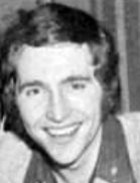
Joe McGovern was a US college athlete who fronted The Sound Judgment. They were an eight-piece band of students from Penn State University, joined by one of their instructors.
Some of the band members quit their studies when their first and only single Happy Without You was released in 1968. The single went nowhere in the USA, and lead singer McGovern continued performing as Cody Marshall.
Later in the same year Melbourne band The Strangers released a rearranged version that charted in Melbourne, Brisbane, and Perth. It is now a fondly remembered oldie in Australia, especially in The Strangers' home city where it charted at #8.
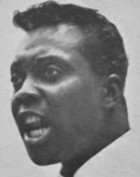
In 1962 Gil Hamilton released the original version of a song called Move & Groove.
Johnny O'Keefe's version, an Australian hit in 1963, used the title Move Baby Move.
Another original version by Gil Hamilton was Tell Her (1962), a hit for The Exciters as Tell Him.
There never was a Gil Hamilton hit, but he didn't remain in obscurity. He changed his name to Johnny Thunder, charted #4 in the USA with Loop De Loop (1963), and had a long and successful career with his new name.
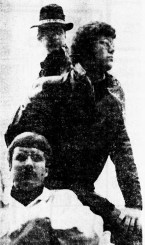
In 1969 The Saturday Morning Cartoon Show recorded two singles in Nashville that were both covered by one Sydney band.
Neither song was a hit for the original artists but the Australian versions of Hayride and La La by Flying Circus did well, reaching #1 in some cities.
The Saturday Morning Cartoon Show were produced by distinguished Nashville music figures Buzz Cason and Mac Gayden who also wrote both songs.
The blurry photo is from an old newspaper. I can find nothing about their identity or the band's history. Perhaps two of them were named Cason or Gaydon, but I'm only guessing.
It was a cute name for a band, but Internet searches for them tend to give you results for, well, Saturday morning cartoon shows.
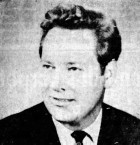
Country music artist Sonny Williams was probably little known outside of Wisconsin. The singer-songwriter-guitarist (1933-2008) was a hard-working live performer over many years in Milwaukee and other cities.
In 1958 he released Bye Bye Baby Goodbye, written by Chicago songwriter Frank McNulty and recorded with an all-star studio band in Nashville. It wasn't a hit for Sonny, although it charted modestly in Milwaukee when he re-recorded it there in 1973.
In Australia Col Joye recorded the song for his first single in 1959. It was one of Col's biggest hits, now a classic Australian oldie.
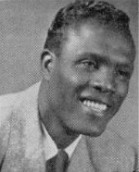
Willy & Ruth recorded the original version of Come A Little Bit Closer (1954), a well-known oldie in Australia through the local hit version by The Delltones (1959).
Come A Little Bit Closer was written by Jerry Leiber and Mike Stoller. It was the first release on their own label, Spark.
Also on Spark soon after was Willy & Ruth's Love Me (1954), later a hit for Elvis Presley, also written by Leiber & Stoller.
Willy Headen and Ruth were both in a gospel quintet called The Honey Bears who were recording for Spark. Willy sang lead, and Ruth was married to the bass singer.
Willy went on to release some records of his own, but nothing more seems to be known about Ruth, not even her surname.
Maybe someone will read this and let us know more.